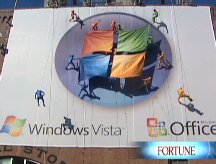It's a tech wreck
Good news from IBM and Apple led to hope that tech could hold up well during the downturn. But Microsoft's layoffs prove that tech isn't recession-proof either.
NEW YORK (CNNMoney.com) -- So much for the tech sector keeping the economy afloat.
Despite strong earnings reports from IBM (IBM, Fortune 500) and Apple (AAPL, Fortune 500) in the past two days, the news Thursday morning that Microsoft (MSFT, Fortune 500) was cutting up to 5,000 employees -- including 1,400 that will be losing their job today -- is a sobering reminder that few companies, even in technology, are immune from this recession.
Tech stocks, not surprisingly, took it on the chin Thursday. Microsoft plunged 8.5%, helping to drag down the Nasdaq by more than 3%.
One bright spot was Apple, which gained about 7% Thursday morning following the company's better-than-expected sales and profit report Wednesday. However, one market strategist noted that Apple is the exception, not the rule.
"The Microsoft news is a reflection of what is really going on in the technology industry as opposed to the Apple earnings," said Alan Skrainka, chief market strategist with Edward Jones in St. Louis. "Apple's news is company specific. It has had a hot hand for awhile and had products that were in strong demand during the holiday season."
Kent Mergler, chairman of Northstar Capital Management, an investment firm with about $300 million in assets based in Palm Beach Gardens, Fla., agreed that the Microsoft news is more indicative of the trend in technology than the solid reports from IBM and Apple.
"It's tough to do well in this environment, and if a company succeeds, it's a huge compliment to management," he said. "Microsoft has turned into the big old sluggish company that IBM used to be."
Mergler's firm owns shares of IBM, Apple and Microsoft, but he said he and his team will have a "serious discussion about whether or not we continue to own it," following Thursday morning's earnings and layoff news.
And based on other earnings reports, it is clear that other technology leaders are also suffering as well.
Finnish cell phone maker Nokia (NOK) disclosed Thursday morning that sales fell nearly 20% in the fourth quarter and that profit plunged almost 70% from a year earlier.
Semiconductor kingpin Intel (INTC, Fortune 500), which reported a 90% drop in quarterly profit for the fourth quarter last week, announced Wednesday it was cutting production at some facilities, affecting 6,000 manufacturing jobs. It said some of the workers could be offered positions at other facilities.
Investors are even worrying about whether Internet search leader Google (GOOG, Fortune 500), which will release its fourth-quarter results after the closing bell, will feel the pain of the economic slump.
While Google is expected to report an earnings increase of 11% -- not shabby in this market -- that is a slower growth rate than many investors have grown accustomed to.
With that in mind, it will be interesting to see if Google continues to cut back on its capital expenditures. The company has been criticized by some analysts for spending recklessly -- even when times were good. But in the third quarter, Google reported that its capital expenditures were down 18% from a year earlier.
One fund manager said that this type of fiscal discipline is necessary for all technology companies, and hinted that the layoff news from Microsoft, while bad now, could help position the company for better times ahead in the future.
Rafael Resendes, manager of the Toreador Large Cap fund, argues that the layoffs -- the company's first in its history -- show that Microsoft is taking the necessary steps to rein in costs. He said many tech companies had not adequately prepared themselves for the recession and were spending too heavily despite signs of a slowdown.
"Tech needs to circle the wagons and get their businesses ready for the future. This downturn is hopefully imprinting in managements' minds that they can't keep growing for the sake of growth forever," said Resendes, who owns Microsoft, Google, IBM and Oracle (ORCL, Fortune 500) in his fund. ![]()



